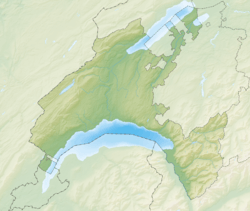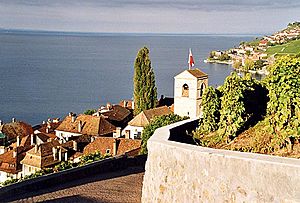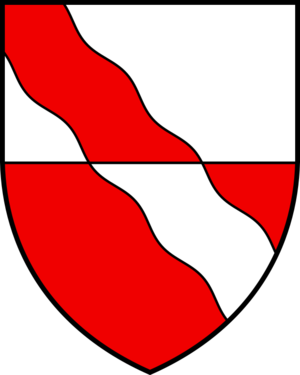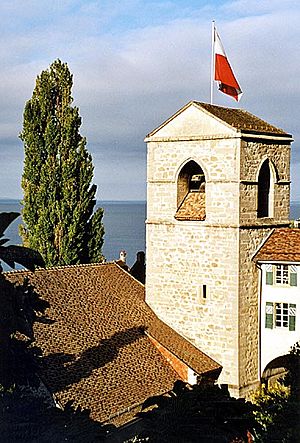Saint-Saphorin facts for kids
Quick facts for kids
Saint-Saphorin
|
||
|---|---|---|
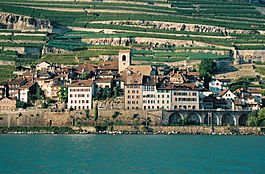
Saint-Saphorin village
|
||
|
||
| Country | Switzerland | |
| Canton | Vaud | |
| District | Lavaux-Oron | |
| Area | ||
| • Total | 0.89 km2 (0.34 sq mi) | |
| Elevation | 400 m (1,300 ft) | |
| Population
(Dec 2020 )
|
||
| • Total | 389 | |
| • Density | 437.1/km2 (1,132/sq mi) | |
| Demonym(s) | Les Saint-Saphoriens | |
| Postal code |
1071
|
|
| Surrounded by | Chardonne, Chexbres, Puidoux, Rivaz, Saint-Gingolph (FR-74) | |
Saint-Saphorin is a charming village in Switzerland. It's located right on the beautiful shore of Lake Geneva. This village is part of the Vaud canton and the Lavaux-Oron area. It is known for its stunning views and rich history.
Contents
History of Saint-Saphorin
Long ago, there was a Gallo-Roman village called Glerula. It was located near where Saint-Saphorin is today. In 563 AD, a huge landslide happened. It fell into the eastern part of Lake Geneva. This caused a giant wave, like a tsunami, to sweep across the lake.
The wave destroyed many villages, including Glerula. Glerula was never rebuilt after this disaster. Instead, a new community started a short distance away. This new village was named after its church, which was dedicated to a saint called Saint-Symphorien. Over many years, the name Saint-Symphorien slowly changed into Saint-Saphorin.
The village of Saint-Saphorin (Lavaux) was first mentioned in official records in 1138.
Geography and Location
Saint-Saphorin (Lavaux) covers a small area of about 0.89 square kilometers (0.34 square miles). A large part of this land, about 56%, is used for farming. This includes fields for crops and vineyards. About 11% of the area is covered by forests.
The rest of the land, around 30%, has buildings and roads. This means that Saint-Saphorin is a mix of natural beauty and settled areas. The village is famous for its vineyards, which are a big part of its landscape.
Saint-Saphorin is made up of the main village and several smaller areas called hamlets. These include Glérolles, Les Faverges, Ogoz, and Lignières.
Village Coat of Arms
A coat of arms is like a special symbol or emblem for a town or family. Saint-Saphorin has its own unique coat of arms. It shows a design with two main colors: silver (white) and red.
Across the middle, there's a wavy line that changes color. This wavy line might represent the nearby Lake Geneva or a river.
People and Population
Saint-Saphorin (Lavaux) is a small community. As of 2022, it has a population of about 348 people. Over the past ten years, the population has changed a little bit.
Most people in Saint-Saphorin speak French. About 88% of the residents use French as their main language. German is the second most common language, spoken by about 5.5% of the people. A small number of people also speak English.
Many people who live in Saint-Saphorin were born there or in the same canton (region) of Vaud. About 28% of the population was born in the village itself. Another 34% were born elsewhere in the Vaud canton.
The population includes people of different ages. About 20% are children and teenagers (under 19 years old). Most of the population, about 66%, are adults between 20 and 64 years old. About 13% are seniors, who are over 64 years old.
Important Heritage Sites
Saint-Saphorin is home to some very important historical places. The Reformed Church of Saint-Symphorien is one of them. This church is special because it also has parts of an old Gallo-Roman villa underneath it. These sites are considered very important to Switzerland's history and culture.
A large part of the area around Saint-Saphorin is also a UNESCO World Heritage Site. This includes the famous Lavaux, Vineyard Terraces. These are beautiful vineyards built on terraces along the lake. They show how people have farmed the land for centuries. The entire village of Saint-Saphorin is also recognized as an important Swiss heritage site.
Economy and Jobs
In Saint-Saphorin (Lavaux), people work in different types of jobs. Many jobs are related to agriculture, especially farming and vineyards. This is because the area is known for its wine production.
Some people work in the service industry. This includes jobs in hotels and restaurants, as well as sales and repairs. A smaller number of people work in manufacturing.
Most people who live in Saint-Saphorin travel outside the village for work. About 60% of the working population uses a private car to get to their jobs. Around 16% use public transportation.
Religion in the Village
Based on information from 2000, most people in Saint-Saphorin belong to a Christian church. About 55% are part of the Swiss Reformed Church. Around 23% are Roman Catholic.
Some people belong to other Christian churches or have no religious affiliation. A small number of people did not state their religion.
Education for Kids
In Saint-Saphorin (Lavaux), many adults have completed a good level of education. About 41% of the population has finished high school. Nearly 20% have gone on to higher education, like university.
For younger students, the local school district provides education. In a recent school year, there were 20 students in primary school. There were also 12 students in lower secondary school. Some students from Saint-Saphorin also attend schools in other nearby towns.
Getting Around (Transportation)
Saint-Saphorin has its own railway station, called St-Saphorin. This station is on the Simplon line, which is a main railway route. You can catch regular trains from here to other towns like Grandson, Lausanne, and Aigle. This makes it easy for residents and visitors to travel to and from the village.
Images for kids
See also
 In Spanish: Saint-Saphorin (Lavaux) para niños
In Spanish: Saint-Saphorin (Lavaux) para niños
 | Jackie Robinson |
 | Jack Johnson |
 | Althea Gibson |
 | Arthur Ashe |
 | Muhammad Ali |




